- Home
- Farley Mowat
A Whale for the Killing Page 2
A Whale for the Killing Read online
Page 2
The little house was for sale.
We offered to rent it but the owner, a young fisherman who wished to become an hourly labourer at the fish plant, refused. He would only sell. The season was late, and there was nowhere else in the world we particularly wanted to be. We liked Messers Cove and its people. We bought the house.
CAPTAIN PENNEY LAID his ship sweetly alongside Burgeo’s snow-dusted government wharf. He waved goodbye from the wing of the bridge as we came down the gangplank toward a knot of people who had gathered, as generations before them had habitually gathered, to meet the coastal boat. An agile little man in his late thirties separated himself from the group and trotted up to us. His dark, sharp-featured face was lit by a smile of welcome.
“Got your wire you was on the boat. Was a wonnerful glitter starm last week and the road’s not fitten for nothin’ only young ’uns on skates. So I brung me dory for to fetch you home. Where’s your gear to? I’ll get it for you.”
Simeon Spencer, proprietor of a tiny general store which occupied the back kitchen of his house, was our closest neighbour at Messers, and perhaps our closest friend. With great solicitude he saw us aboard his powered dory, stowed our luggage, and cast off.
It was a bitterly cold evening and, despite the wind-lop, a rubbery film of cat-ice was forming over the runs between the islands leading past Firby Harbour, Ship Dock and Muddy Hole, and westward to our own cove—Messers. Spray froze on the backs of our coats as we hunched forward on the thwart facing the diminutive figure of Sim, who stood erect and birdlike in the stern. Unexpectedly, he shoved the rudder hard down and the dory lay over so sharply that Claire and I slid sideways on the thwart. Sim was waving an arm seaward, and over the clatter of the engine I could just make out the word he shouted.
“Whales!”
He was pointing toward Longboat Rocks, a line of black reefs glistening with the salt seas breaking over them. Just beyond the Longboats was something else, also black and glistening, that surged slickly into view, then sank smoothly from sight, leaving behind it a plume of fine mist which was quickly blown away by the nor’easter.
That blurred, elusive glimpse of one of the Great Ones of the oceans was a fine homecoming gift. I have always been fascinated by the mysterious lives of the non-human animals who share this world with us, but until I went to live on the Sou’west Coast the mystery of the whale had scarcely come my way, although it is perhaps the greatest mystery of all. Burgeo had given me the chance to approach that mystery when, each winter, a little group of fin whales took up seasonal residence for a few months in the waters of the archipelago.
Sim had turned the dory into Messers Cove. He cut the engine as we approached his stage.
“When did the whales come back?” I asked as the dory drifted toward the wharf.
“Like always. First part o’ December... along of the herring scull. They’s five... maybe six cruising midst the islands, and they’s the biggest kind!... Here now, Missus, watch the ice!”
Together we helped Claire up the slippery front of the stage and in the excitement of this long-anticipated arrival the whales were temporarily put out of mind. None of us could then have guessed the momentous changes in all our lives which were to follow from their presence.
All the lights in our house were burning. When we stamped across the storm porch and entered the kitchen we found the stoves all roaring. Sim’s fourteen-year-old daughter, Dorothy, had swept and polished every inch of every room. Old Mrs. Harvey had sent over two loaves of homemade bread, still oven-hot. And bubbling fragrantly in a pot on the oil range was a boiled dinner: cabbage, turnips, potatoes, onions, salt beef and moose meat.
The little house which had stood empty for six months was as warm and welcoming as if we had never left it. Our delight was also Sim’s delight as he sat unobtrusively nursing a glass of rum in front of the Franklin stove. His self-imposed duty was not yet completed. It was now his task to bring us up-to-date on the really vital events which had taken place during our absence.
“They was talk of a strike down to the plant, but the owner, he put an end to it right quick. Said he’d close her up and move clear of Burgeo and leff the people lump it if they didn’t care to work to his wish. Don’t know where he figgered on going, but they’s plenty folk here could name a place proper for the likes of he!... Curt Bungay, he’s bought a new boat, a longliner from down Parsons Harbour way... Your schooner’s hauled up clear, and Joe, he found her leak... one of ’em anyhow... They’s a new nurse to the hospital; chinee they says she is, but she’s good for it. Comes out the dirtiest sort of weather to take care of folks... Good run o’ fish this winter, but nothin’ fit to call a price...”
And so it went, in rapid-fire bursts, until a decent time having been allowed for us to have our dinner and settle in a bit, other visitors began clumping over the porch and unceremoniously letting themselves into the kitchen. A bevy of teenage girls led the way. They sat in a tidy row on the kitchen daybed and said nothing; only beamed, giggled and nodded as we tried to make conversation with them. Then, with familiar uproar, Albert, our big black water dog, came galumphing into the kitchen bearing a dried codfish as a homecoming present. Close behind him came his, and our, friend, eighty-year-old Uncle Job; gnomelike, ebullient and grinning thirstily as he spotted the rum bottle on the kitchen table. During our absence Albert had lived with Uncle Job and his wife and, according to what Sim told us later, dog and man had spent most of their time engaged in acrimonious debate as to whether they would, or would not, go fishing, go for a walk, go for a swim, go to bed, or get up in the morning. They were both inveterate argufiers.
“He’ll miss that dog some bad,” Sim said. “Wuss’n he’d miss his woman. She never says a word, and it drives he fair wild when he can’t get an argument.”
Rather reluctantly, Albert delivered over the cod—a fine one it was too, for Uncle Job was one of the few Burgeo people who still knew and practised the age-old art of drying and salting fish. Albert then sniffed in a perfunctory way at our luggage with its stickers from Irkutsk, Omsk, Tbilisi and other exotic places, barged into the living room, climbed up on the sofa, grunted once or twice, and went to sleep.
The homecoming was complete.
2
THE STORM BLEW ITSELF OUT that night and in the morning the sun shone white and harsh upon the ice-capped islands. The sea had an ebony sheen to match the glitter left on the land by the recent sleet storm. Taking advantage of what would surely be an all-too-brief spell of fine weather, the inshore fishermen—those who fished the local grounds with gill nets, trawls and handlines—were early at work, their small boats no more than distant motes on the metallic mirror of the sea.
Leaving Claire to get on with the unpacking as best she might under the solemn eyes of the neighbourhood children, who drifted in and out of the kitchen like voiceless wraiths, I took Albert and set out to collect the mail. Since the trail (it could only be called a road out of courtesy) leading to the eastern end of Burgeo was still impassable because of its skin of ice, I borrowed Sim’s dory and took the water route instead.
It was marvellously exhilarating to be on the sea. The day was calm and the sky blindingly clear. As usual, Albert rode standing up in the bows, leaning far forward so that he looked like a pagan totem. When occasional dovekies and sea pigeons rose heavily ahead of us and skittered off to the sides, he eyed them with disdain.
We puttered along close under the land—close enough to sniff the iodine tang of kelp exposed at ebb tide; close enough to recognize and be recognized by people in the shoreside houses. Sim Spencer’s wife, busy hanging out the wash, gave us a welcoming wave. Josh Harvey’s calico dog, Jumbo, barked insults at Albert from a stage head, and Albert richly returned them. I shouted a greeting at Uncle Matt Fudge, ninety-one years old, but still young enough to be mending a cod net in the sunny shelter of his grandson’s fish store. (Everyone above
the age of fifty in an outport is known to everybody else as “Uncle,” or as “Aunt.”)
From Messers as far as Frank Island the shore we were coasting was encrusted by a fringe of sturdy houses which had been occupied for generations. They were the “old” Burgeo, and they were a joy to behold. They looked married to the rock on which they stood, a neat but unobtrusive frieze along the shore. Yet each home stood in quiet singularity. No two faced in the same direction. No two were on the same level nor were of quite the same construction, even though most were of the venerable two-storey, low-peaked pattern common to Newfoundland outports. They gave the impression of a kind of unpretentious and nonaggressive independence. However, when the dory slipped through the tickle north of Frank Island, the scene changed abruptly. This was where the New Burgeo, creation of modern times, began.
In 1949, when Newfoundland became a reluctant part of Canada, Burgeo was not a single community but a patchwork of dispersed little settlements. Along the shoreline of Grandy Island—which dominates the archipelago as an anchored battleship dominates a fleet of lesser craft—lay the hamlets of Messers Cove, Muddy Hole, Firby Cove, Samways, The Harbour and The Reach. Clinging to the off-lying and much smaller islands, or strung along the adjacent mainland shores, lay Seal Brook, Kings Harbour, Our Harbour, Hunt’s Island, Sandbanks and Upper Burgeo. Although none of these held more than two dozen families, each had preserved its own identity through a century and more.
Confederation with Canada put an end to all that. In 1948 Newfoundland was still nominally a self-governing Dominion in the British Empire; but in 1949, goaded and harried by a messianic little man named Joseph Smallwood (some called him satanic), Newfoundland was stampeded into joining Canada. Smallwood won the decisive vote by the slimmest of margins as islanders of all classes fought desperately for the retention of their independence, impoverished as it was. For these dissenters, independence was of greater worth than flash prosperity. Smallwood, on the other hand, regarded independence as an insufferable barrier to progress. Most Newfoundlanders, he once contemptuously said, did not know what was good for them and would have to be hauled, kicking and screaming, into the twentieth century. He was just the man to do the hauling.
He became the island’s first provincial premier and during the next twenty-two years ran Newfoundland almost single-handedly, according to his personal concept of what was good for it. It was a simple concept: industrialize at all costs. This meant that all the island’s mineral, forest and human resources were to be made available, virtually as gifts, to any foreign industrial entrepreneurs who would agree to exploit them. Smallwood demanded that Newfoundland turn its back on the ocean which had nurtured the islanders through so many centuries.
“Haul up your boats... burn your fishing gear!” he shouted during one impassioned speech directed at the outport men. “There’ll be three jobs ashore for every one of you. You’ll never have to go fishing again!”
Many believed him, for he was a persuasive demagogue, and he had the silver tongue.
One of the first hurdles he had to overcome was to find means of concentrating the “labour resources” (by which term he described the people of the outports) who were dispersed in about thirteen hundred little communities scattered along some five thousand miles of coastline. Smallwood’s solution was “Centralization,” which, translated, meant the forced and calculated merger of the outports so that labour pools could be formed from the transported occupants. The methods used to destroy the small outports were devious, usually deceitful, sometimes brutal... and almost always effective.
Along the Sou’west Coast the “moving fever,” implanted and cultured by the Smallwood men, soon began to take effect. One by one the outports sickened and died. Even in the Burgeo archipelago, where everyone already lived within a four-mile radius of everyone else, the fever raged with such fury that in a few years all the off-lying communities had moved to Grandy Island.
Although Smallwood rejected the sea and scorned fishing as a way of life, his was not an absolute rejection. Even in his most sanguine dreams he appears to have realized that there were parts of Newfoundland which could not be turned into facsimiles of Detroit or Hamilton. The Sou’west Coast was such an area. Smallwood’s answer to how best to exploit its labour potential was to heavily subsidize construction of a fish-freezing plant on Short Reach, at the east end of Grandy Island. This plant was “sold” for a ridiculously small sum to the son of a St. John’s merchant prince who found himself in the happy position of being able to pay what he chose for labour while setting his own price for the fish he bought.
There were some initial difficulties. Not many men could be persuaded to abandon their way of life in order to become wage employees at as little as ten or twenty dollars a week. However, as the people of the neighbouring outports began to converge on the “growth centre” of Burgeo, a surplus labour force developed. It consisted of people who had always hated the very thought of welfare—the dole, they called it—and were willing to work at almost anything, for almost any wage, rather than accept relief.
The heaviest concentration of immigrants settled close to the fish plant. When all the available shoreline was occupied, newcomers were forced to build away from the sea on barren rocky ridges or on peaty muskegs. They built hurriedly and, contrary to their wont, many built badly. They had no money with which to buy materials and, since they were wage slaves, they had no time to do as their fathers had done and go into the country to cut and whipsaw their own lumber. All too many of the new residents, who had been forced or deluded into abandoning comfortable and well-built houses in the now deserted outports, were reduced to living in unsightly shacks. These proliferated until they produced the first true fruits of centralization—the Sou’west Coast’s first slum.
The eastern end of Grandy Island turned into a wasteland of rusting cans, broken bottles, spilled garbage and human sewage. The surrounding waters were further defiled by the vast volume of effluvia from the fish plant, which discharged all its wastes and offal directly into Short Reach. Much of the shoreline was befouled by a belt of black sticky muck several inches thick and six to ten feet broad which, particularly at low tide, stank to high heaven.
Apart from the physical degradation of what had once been a wholesome and natural environment, centralization also degraded the people who were its victims. The delicate interdependence of give and take was disrupted. As Sim Spencer once explained it to me:
“Afore the plant come here, every little place was on its own. Every settlement was like a family; and all the families, all along the coast, they got along good, never rubbed nobody the wrong way. Every man looked after his own, but he looked to his neighbour when times was hard, and for certain sure he’d be quick enough to give a hand when anyone else was needy.
“Now that’s all gone abroad. Shovin’ all hands into one big lobster pot done something to the people. Started fillin’ them up with badness. Turned them one agin the other. Started them wheening and growling like a pack of crackie dogs penned up on some little pick of an island.
“These times, everyone’s jealous of t’other, and ’twas never that way before. People is uncontented. They don’t want nobody to get nothin’ unless they gits it too, and more of it. Truth to tell, people is turning right hateful in Burgeo, these times.”
The independent people, and the egalitarian way of life, could not survive the tides of change as more and more people came to Burgeo from more and more “closed-out” outports. There was not nearly enough wage work to go around. The new men could not fish successfully for themselves because the local grounds were foreign to them and were by now seriously overcrowded and overfished as well. Consequently, scores of men, both young and old, were forced to leave their families behind and seek work, not only outside Burgeo, but outside Newfoundland, where the grandiose industrial schemes of Premier Smallwood had come to nothing. Some men worked seasonally in Nova Sco
tia; others spent eight months of each year manning Great Lakes freighters—eight months away from home.
As if this were not enough, compulsive consumerism, the universal sickness of modern society, infected the dispossessed outport people. Men, women and children who had never cared much for material possessions became greedily acquisitive. They began to thumb avidly through the shiny mail-order catalogues. The solid, handmade furniture they had brought with them from the outports was now “condemned”—thrown over the ends of the stages to float away on the tides. It was replaced with chrome and arborite.
The plant owner, ever anxious to develop consumer attitudes and appetites, opened a supermarket. Some of the befuddled victims of the new disease actually bought television sets even though there was no transmitter which could reach them.
Electricity and roads spread their web through the increasingly congested maze of houses. Two miles of incredibly rough trails were hewn from the living rock and, in 1962, the first two cars were unloaded from the coastal boat. They met a happy fate a few days later when they collided head-on and both were reduced to junk.
During the five years Claire and I lived in Burgeo, Progress made further stunning strides. By 1967 there were thirty-nine cars and trucks rattling themselves to pieces on the stony goat tracks which led nowhere, and never would. The first snowmobile had gone snarling out into the barrens, where it fell into a crevice; but the following year saw five more on order. The non-returnable pop and beer bottle arrived. On sunny summer days the rocks which made up most of the physical surroundings gleamed and glittered in fairy colours from the layers of glass shards which littered them. In 1961 there had been no welfare officer and no unemployment. But by 1967 Burgeo had these modern advantages as well as a new fish meal reduction plant to spread its oily, nauseous fumes like a miasma over the entire community.

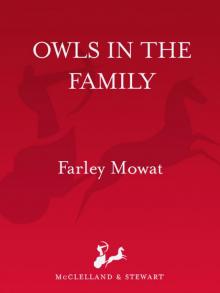 Owls in the Family
Owls in the Family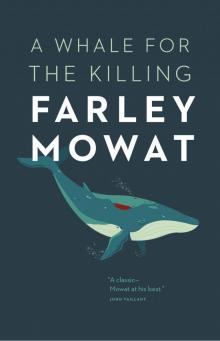 A Whale for the Killing
A Whale for the Killing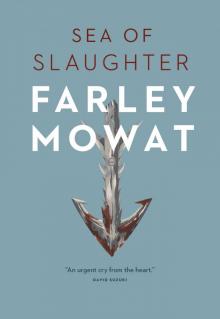 Sea of Slaughter
Sea of Slaughter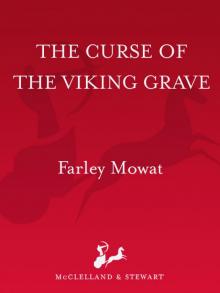 The Curse of the Viking Grave
The Curse of the Viking Grave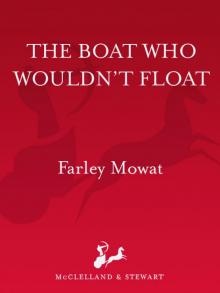 The Boat Who Wouldn't Float
The Boat Who Wouldn't Float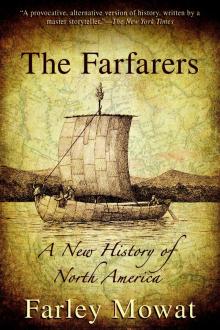 The Farfarers: Before the Norse
The Farfarers: Before the Norse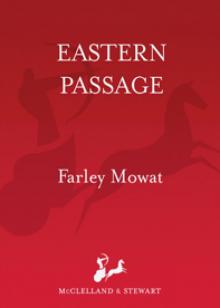 Memoir
Memoir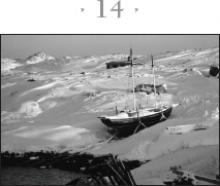 Bay of Spirits: A Love Story
Bay of Spirits: A Love Story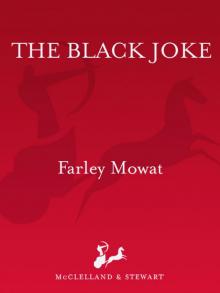 The Black Joke
The Black Joke Sibir: My Discovery of Siberia
Sibir: My Discovery of Siberia The Dog Who Wouldn't Be
The Dog Who Wouldn't Be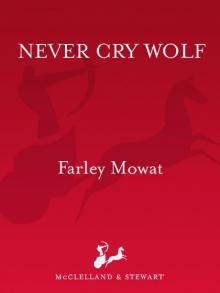 Never Cry Wolf
Never Cry Wolf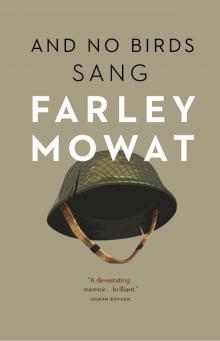 And No Birds Sang
And No Birds Sang The Snow Walker
The Snow Walker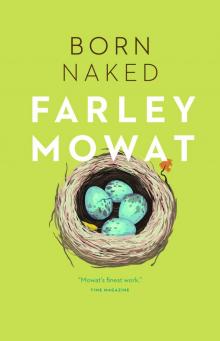 Born Naked: The Early Adventures of the Author of Never Cry Wolf
Born Naked: The Early Adventures of the Author of Never Cry Wolf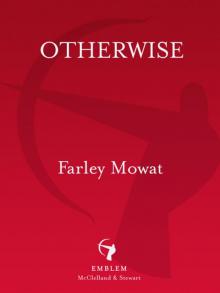 Otherwise
Otherwise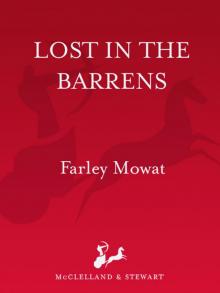 Lost in the Barrens
Lost in the Barrens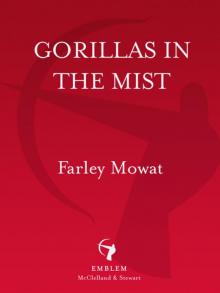 Gorillas in the Mist
Gorillas in the Mist People of the Deer
People of the Deer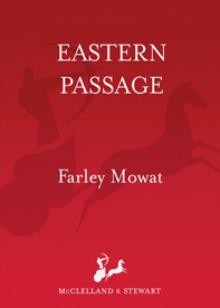 Eastern Passage
Eastern Passage Sibir
Sibir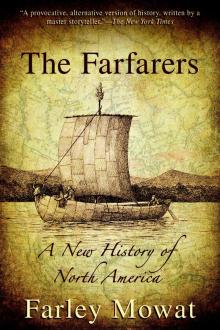 The Farfarers
The Farfarers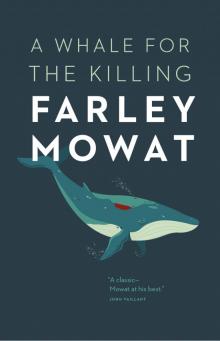 A Whale For The Killing (v5.0)
A Whale For The Killing (v5.0)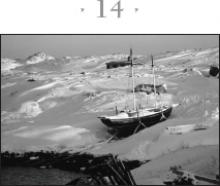 Bay of Spirits
Bay of Spirits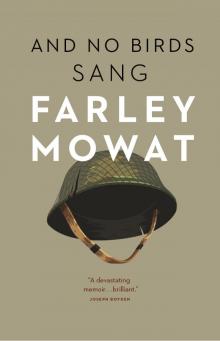 And No Birds Sang (v5.0)
And No Birds Sang (v5.0)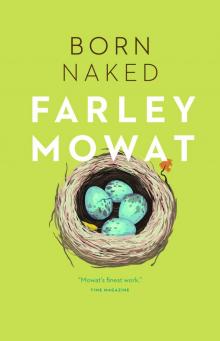 Born Naked
Born Naked